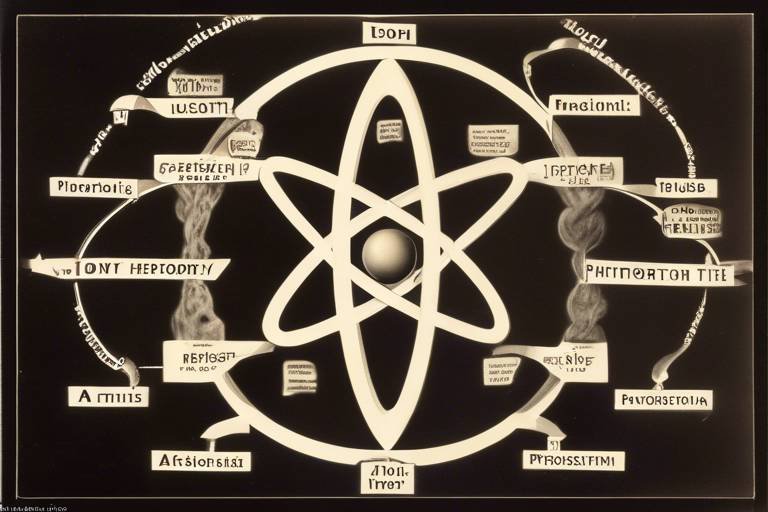The Metaphysics in Particle Physics
In the vast tapestry of the universe, particle physics serves as a thread that weaves together the intricate details of existence. But what happens when we peek behind the curtain of this scientific discipline? The exploration of particle physics doesn't just unveil the building blocks of matter; it also invites us to ponder the profound metaphysical questions that lie beneath the surface. How do we define reality? What does it mean for something to exist? These questions are not just for philosophers sitting in dimly lit cafes; they are at the heart of modern science, challenging our understanding and perceptions.
The journey into the metaphysics of particle physics reveals a landscape where traditional notions of existence are turned upside down. Imagine standing on the edge of a cliff, looking out at a vast ocean that seems to stretch endlessly. Just as that ocean is made up of countless droplets, the universe is composed of fundamental particles that behave in ways that defy our common sense. This article aims to explore how these particles not only build the material world but also shape our philosophical inquiries about reality, existence, and the very fabric of the cosmos.
As we delve deeper, we will uncover the dual nature of matter, the mind-boggling concept of quantum superposition, and the mysterious phenomenon of entanglement. Each of these elements is not just a scientific curiosity; they are gateways to understanding the metaphysical implications of our universe. So, buckle up as we embark on this fascinating journey through the metaphysical dimensions of particle physics, where science and philosophy intertwine in a dance as intricate as the particles themselves.

The Nature of Reality
When we dive into the world of particle physics, we find ourselves standing at the precipice of a profound philosophical inquiry: what is the true nature of reality? Traditional views of reality, grounded in classical physics, suggest a world that is tangible, predictable, and governed by fixed laws. However, particle physics, with its intricate dance of subatomic particles, challenges these notions, inviting us to rethink what it means for something to exist. Imagine a world where particles can be in two places at once or where the act of looking at something changes its very essence. It's mind-boggling, right?
In the quantum realm, particles are not just tiny balls zipping around; they embody a duality that defies our everyday experiences. This duality leads us to question the very fabric of existence. Are we merely observers in a grand cosmic play, or do we have a role in shaping the narrative? The implications are staggering:
- Existence is Relative: In the quantum world, existence often depends on observation. A particle may exist in a state of potential until it is measured, making us ponder whether reality is dependent on our perception.
- Challenge to Objectivity: If our observation can influence outcomes, how can we claim to have an objective understanding of the universe?
- Reality as a Construct: Could it be that reality is a construct of our consciousness, shaped by our thoughts and perceptions?
These questions lead us to a fascinating intersection of science and philosophy. The metaphysical implications of particle physics push us to consider that reality might not be a fixed entity but rather a dynamic interplay of forces and consciousness. This perspective aligns with some ancient philosophical ideas, suggesting that the universe is more like a vast, interconnected web than a collection of isolated objects.
Moreover, as we explore the quantum realm, we encounter the concept of non-locality. This idea posits that particles can be interconnected regardless of the distance separating them, leading to the realization that our understanding of space and time might be fundamentally flawed. Imagine two entangled particles, one on Earth and the other light-years away, influencing each other's state instantaneously. This phenomenon raises profound questions about the nature of causality and the interconnectedness of all things.
In essence, particle physics invites us to reconsider the very foundations of reality. It challenges us to embrace uncertainty and complexity, suggesting that the universe is not just a mechanical clockwork but a living, breathing entity full of mysteries waiting to be unraveled. As we journey deeper into this enigmatic world, we may find that the answers we seek are not just scientific but also deeply philosophical, urging us to expand our understanding of existence itself.

When we dive into the world of particle physics, we encounter a captivating paradox: the duality of matter. It’s almost like a cosmic dance where particles can be both waves and particles simultaneously. Imagine trying to catch a shadow; it slips through your fingers, yet it’s always there. This dual nature challenges our conventional understanding of what it means to exist. Are we merely observing a façade, or is there a deeper reality lurking beneath the surface?
To illustrate this, let’s consider the famous double-slit experiment. When light is shone through two closely spaced slits, it creates an interference pattern on a screen behind, suggesting that light behaves like a wave. However, when we try to observe which slit the light passes through, it behaves like a particle, creating two distinct marks on the screen instead of the interference pattern. It's a classic case of quantum weirdness. This experiment not only showcases the duality of light but also raises profound questions about the nature of existence and observation.
This wave-particle duality extends beyond light; it applies to all matter. Electrons, for instance, exhibit wave-like properties under certain conditions, yet they are also detected as discrete particles. This leads us to ponder: if everything is both a wave and a particle, what does that say about the very fabric of reality? Is it possible that reality is not as solid and fixed as we perceive it to be? Perhaps, at a fundamental level, everything is interconnected in a vast, dynamic web of probabilities.
As we grapple with these ideas, we might find ourselves asking, "How do we reconcile these two perspectives?" One way to approach this is through the lens of quantum mechanics and its implications for our understanding of existence. The implications are staggering: if particles can exist in multiple states simultaneously, then our reality might be a tapestry woven from countless possibilities. This notion challenges the deterministic view of the universe, suggesting instead that existence is fluid and ever-changing.
In summary, the wave-particle duality is not just a scientific curiosity; it is a profound philosophical inquiry. It invites us to reconsider our understanding of reality, existence, and the very nature of being. As we continue to explore the quantum realm, we may find that the answers to these questions could reshape our perception of the universe itself.
- What is wave-particle duality? - Wave-particle duality refers to the phenomenon where particles, such as light and electrons, exhibit both wave-like and particle-like properties depending on the type of measurement being performed.
- How does the double-slit experiment illustrate this concept? - The double-slit experiment shows that particles can create an interference pattern like waves when not observed, but act like particles when an observation is made, highlighting their dual nature.
- What are the implications of wave-particle duality for our understanding of reality? - It suggests that reality may not be as fixed as we perceive, as particles can exist in multiple states and are influenced by observation, challenging traditional notions of determinism.

Quantum superposition is one of those mind-bending concepts that really makes you question everything you thought you knew about reality. Imagine a world where a single particle can exist in multiple states at the same time—sounds like something out of a sci-fi novel, right? But in the quantum realm, this is not just a whimsical idea; it’s a fundamental principle that shapes our understanding of the universe. When we say that a particle is in superposition, we mean that it can be in several different states simultaneously until it is observed or measured. This brings us to a fascinating crossroads: what does it mean for something to exist? Is it real if we can’t see it? This dilemma echoes through the corridors of philosophy and science alike.
To illustrate this concept, let’s consider the famous thought experiment known as Schrödinger's cat. Picture a cat in a sealed box with a radioactive atom that has a 50% chance of decaying. If it decays, a mechanism releases poison, and the cat dies; if it doesn’t, the cat lives. Until we open the box and observe the cat, it is said to be in a superposition of both alive and dead states. This paradox highlights the bizarre nature of quantum mechanics and raises profound questions about the nature of existence itself. Are we, as observers, somehow influencing reality just by looking at it? It’s a tantalizing notion that blurs the lines between observer and observed.
But let’s not get too lost in the philosophical weeds just yet. Quantum superposition also has practical implications, particularly in the realm of quantum computing. In classical computers, bits are either 0 or 1, but in quantum computers, qubits can exist in a state of 0, 1, or both at the same time, thanks to superposition. This allows quantum computers to process vast amounts of information at unprecedented speeds, potentially revolutionizing fields like cryptography, drug discovery, and artificial intelligence. The implications are staggering, and they lead us to wonder: if superposition can enhance our technological capabilities, what other mysteries of the universe are waiting to be unveiled?
In summary, quantum superposition challenges our traditional notions of reality and existence. It invites us to reconsider what we know about observation, measurement, and the very fabric of the universe. As we delve deeper into the quantum world, we find ourselves at the intersection of science and philosophy, where every answer leads to more questions. This intricate dance of particles in superposition not only enriches our understanding of physics but also compels us to reflect on our place within this vast, mysterious cosmos.
- What is quantum superposition? Quantum superposition is the principle that a quantum system can exist in multiple states at the same time until it is measured or observed.
- How does quantum superposition relate to Schrödinger's cat? Schrödinger's cat is a thought experiment that illustrates quantum superposition by suggesting that the cat is simultaneously alive and dead until observed.
- What are the practical applications of quantum superposition? Quantum superposition is crucial in the development of quantum computing, allowing qubits to process information more efficiently than classical bits.
- Does observation affect reality in quantum mechanics? Yes, the act of observation in quantum mechanics can influence the state of a particle, leading to discussions about the role of consciousness in shaping reality.

When we dive into the deep waters of quantum mechanics, we often find ourselves grappling with the implications of concepts like quantum superposition and entanglement. These ideas not only challenge our understanding of the physical world but also raise profound questions about our own existence and the nature of free will. Are we truly the architects of our choices, or are our decisions merely the byproducts of quantum events that we cannot control?
The concept of quantum superposition suggests that particles can exist in multiple states at once until they are observed. This leads to the tantalizing idea that our own thoughts and decisions might exist in a state of potentiality, much like a particle poised between two different outcomes. Imagine standing at a crossroads with infinite paths ahead of you, each representing a different choice. In the quantum realm, all these paths might exist simultaneously until you make a decision, collapsing that wave of possibilities into a single reality. This brings us to a critical question: if the universe is inherently probabilistic, where does that leave our sense of agency?
Furthermore, the implications of quantum entanglement complicate matters even further. When particles become entangled, the state of one particle is immediately linked to the state of another, regardless of the distance separating them. This interconnectedness could imply that our choices are not as independent as we might like to believe. The idea that our decisions could be influenced by distant events challenges the very foundation of our understanding of free will. Are we, in essence, puppets dancing to the quantum strings of the universe?
Philosophers and scientists alike have pondered these questions, leading to various interpretations of quantum mechanics. For instance, the Copenhagen interpretation suggests that reality is not determined until it is observed, implying a significant role for consciousness in shaping what we perceive as reality. On the other hand, the many-worlds interpretation posits that all possible outcomes exist in parallel universes, suggesting a broader canvas for free will but also complicating our understanding of choice. Are we merely navigating through one of these many worlds, or do we have the power to influence which world we experience?
Ultimately, the implications of quantum mechanics on free will force us to re-evaluate our understanding of existence itself. While we may feel like we are in the driver's seat of our lives, the reality may be much more intricate and interconnected than we can comprehend. The interplay of quantum physics and philosophy invites us to explore the depths of consciousness, choice, and the fundamental nature of reality, leaving us with more questions than answers.
- What is quantum superposition? Quantum superposition is a principle of quantum mechanics where a particle can exist in multiple states or locations simultaneously until it is measured or observed.
- How does entanglement relate to free will? Entanglement suggests that particles can be interconnected regardless of distance, raising questions about whether our choices are truly independent or influenced by distant quantum events.
- Does consciousness play a role in quantum mechanics? Some interpretations, like the Copenhagen interpretation, suggest that consciousness may be necessary for the collapse of the wave function, impacting how reality is perceived.
- Are there different interpretations of quantum mechanics? Yes, there are several interpretations, including the Copenhagen interpretation and the many-worlds interpretation, each offering unique perspectives on reality and free will.

The realm of particle physics is not just a playground for physicists; it’s also a fertile ground for metaphysical inquiry. As we delve into the intricacies of quantum mechanics, we encounter various interpretations that challenge our understanding of reality itself. At the heart of these interpretations lies a fundamental question: What does it mean for something to exist? The Copenhagen interpretation, for instance, suggests that particles do not have definite properties until they are observed. This leads us to ponder whether reality is something that exists independently of our perception or if it is shaped by our very act of observing.
On the other hand, we have the many-worlds interpretation, which proposes that every quantum event branches into multiple realities, creating a vast multiverse. This notion can be quite mind-boggling! Imagine a universe where every possible outcome of a decision plays out in its own separate reality. It raises intriguing metaphysical questions about the nature of existence and the paths not taken in our own lives. Are we merely travelers through one of these many branches, or do we have a say in which branch we navigate?
Moreover, these interpretations are not merely academic exercises; they have profound implications for our understanding of free will, consciousness, and the interconnectedness of all things. For example, if our reality is shaped by observation, does that mean our consciousness plays a pivotal role in the universe? Are we, in some sense, co-creators of reality? The implications of such questions can be both exhilarating and daunting, forcing us to confront our own beliefs about existence.
To further illustrate these metaphysical interpretations, consider the following table that summarizes key differences between the Copenhagen interpretation and the many-worlds interpretation:
| Interpretation | Key Concepts | Metaphysical Implications |
|---|---|---|
| Copenhagen | Particles exist in a state of probability until observed. | Reality is dependent on observation; existence is subjective. |
| Many-Worlds | Every quantum event creates branching realities. | All possibilities are realized; existence is vast and interconnected. |
In conclusion, the metaphysical interpretations of particle physics invite us to question the very fabric of reality. They challenge us to rethink our understanding of existence, consciousness, and the universe. Are we mere observers in a deterministic world, or are we active participants in the unfolding of reality? These questions may not have definitive answers, but they certainly enrich our exploration of the cosmos and our place within it.
- What is the Copenhagen interpretation?
The Copenhagen interpretation posits that particles do not have definite properties until they are measured, suggesting that observation plays a crucial role in shaping reality.
- What does the many-worlds interpretation imply?
The many-worlds interpretation suggests that every quantum event results in the creation of parallel universes, leading to an infinite number of realities where every possible outcome occurs.
- How do these interpretations affect our understanding of free will?
These interpretations raise questions about whether our choices are predetermined or if we can influence the outcomes through our consciousness and observations.
- Are there other interpretations of quantum mechanics?
Yes, there are several other interpretations, including pilot-wave theory and objective collapse theories, each offering different perspectives on the nature of reality.

Quantum entanglement is one of the most mind-boggling phenomena in particle physics. Imagine two particles that are so deeply connected that the state of one instantly influences the state of the other, no matter how far apart they are. This connection challenges our classical understanding of the universe, where objects are only influenced by their immediate surroundings. It's almost as if these particles are communicating through some invisible thread, defying the very fabric of space and time. This phenomenon raises profound metaphysical questions about how we perceive reality and the interconnectedness of all things.
To grasp the significance of entanglement, consider the following: when two particles become entangled, their properties are linked such that measuring one particle immediately gives you information about the other. This instantaneous connection occurs regardless of the distance separating them, which Einstein famously referred to as "spooky action at a distance." The implications of this concept challenge our traditional notions of locality—the idea that objects are only directly influenced by their immediate surroundings. In essence, entanglement suggests that the universe is much more interconnected than we previously thought.
Furthermore, entanglement leads us to ponder the nature of reality itself. If particles can be entangled over vast distances, what does that mean for our understanding of causality? Are events predetermined, or is there a deeper layer of reality that we have yet to comprehend? These questions are not just academic; they touch on the very essence of existence and how we relate to the cosmos. The interconnectedness implied by entanglement hints at a reality where everything is woven together, challenging the individualistic perspective that often dominates our thinking.
To illustrate the concept of entanglement further, consider the following table that summarizes key aspects:
| Aspect | Description |
|---|---|
| Definition | A quantum phenomenon where particles become interconnected, affecting each other's states regardless of distance. |
| Locality | Challenges the classical notion that objects can only influence their immediate surroundings. |
| Causality | Raises questions about the nature of cause and effect in a nonlocal universe. |
| Implications | Suggests a deeper interconnectedness in the universe, prompting philosophical inquiries about reality. |
As we delve deeper into the implications of entanglement, we find ourselves at the crossroads of science and philosophy. The phenomenon not only invites us to rethink our understanding of physics but also compels us to reconsider our place in the universe. Are we mere observers, or are we active participants in a grand cosmic dance? The answers may lie in embracing the mysteries that entanglement presents, pushing us to explore the nonlocal connections that bind us all.
- What is quantum entanglement?
Quantum entanglement is a phenomenon where two or more particles become linked, such that the state of one particle instantly influences the state of the other, regardless of the distance between them. - How does entanglement challenge classical physics?
Entanglement challenges classical physics by suggesting that particles can affect each other instantaneously, defying the traditional understanding of locality and causality. - What are the philosophical implications of entanglement?
The philosophical implications include questions about the nature of reality, interconnectedness, and the limits of human understanding in a nonlocal universe. - Can entanglement be observed in experiments?
Yes, entanglement has been observed in numerous experiments, confirming its existence and providing insights into the fundamental workings of quantum mechanics.

The observer effect is one of those mind-boggling concepts in quantum mechanics that can make you question everything you thought you knew about reality. Imagine you're at a party, and every time you look at someone, they suddenly change their behavior. This is somewhat analogous to what happens in the quantum world. When we observe particles, we inadvertently change their state. It's as if the act of looking is enough to alter the very fabric of existence. This phenomenon has profound implications for our understanding of reality and raises the intriguing question: does consciousness play a role in shaping the universe around us?
To grasp the observer effect, we need to consider how quantum mechanics operates. In classical physics, we could measure the properties of a particle without affecting it. However, in the quantum realm, the act of measurement itself alters the state of the particle. For instance, when scientists measure the position of an electron, they can only determine its location at that moment, but in doing so, they disturb its momentum. This leads us to ponder: if our mere observation can change the outcome, what does that say about the nature of reality? Are we merely passive observers, or are we active participants in the unfolding of the universe?
One fascinating aspect of the observer effect is its implications for consciousness. Could it be that our awareness is intertwined with the physical world in a way we have yet to fully understand? This idea suggests that consciousness is not just a byproduct of brain activity but rather a fundamental aspect of the universe itself. Imagine consciousness as a lens through which reality is filtered; when we focus on something, we bring it into existence in a certain way. This leads to a myriad of philosophical questions about the nature of reality, knowledge, and perception.
To further explore this concept, consider the following points:
- Measurement and Reality: The act of measuring a quantum system can lead to different outcomes, suggesting that reality is not fixed but rather fluid.
- Consciousness as a Catalyst: Some theories propose that consciousness may play a role in collapsing the wave function, determining the state of a particle.
- Philosophical Implications: The observer effect challenges our understanding of knowledge and perception, raising questions about the limits of human understanding.
In essence, the observer effect is a doorway into a deeper understanding of both particle physics and the nature of reality itself. It invites us to question our role in the universe and whether we are simply observers or active participants in a grand cosmic play. As we delve deeper into the mysteries of quantum mechanics, the lines between observer and observed become increasingly blurred, challenging our perceptions and inviting us to ponder the philosophical ramifications of our existence.
| Question | Answer |
|---|---|
| What is the observer effect? | The observer effect refers to changes that the act of observation can make on a quantum system. |
| How does the observer effect relate to consciousness? | It raises questions about whether consciousness influences the state of particles or reality itself. |
| What are the philosophical implications of the observer effect? | It challenges our understanding of knowledge, perception, and the nature of reality. |

When we dive into the depths of particle physics, we stumble upon a tantalizing question: what role does consciousness play in shaping our understanding of reality? It's a bit like trying to catch smoke with your bare hands—elusive and complex. The relationship between consciousness and the physical world has intrigued philosophers, scientists, and curious minds alike. Imagine standing at the edge of a vast ocean, where every wave represents a different possibility of existence. Now, imagine that your awareness is the breeze that shapes those waves, giving them form and direction. This metaphor captures the essence of how consciousness might influence reality.
At the heart of this discussion is the observer effect, a phenomenon in quantum mechanics where the act of observation alters the state of a particle. It’s as if the universe is playing a game of hide and seek, where the very act of looking changes what you find. This raises profound questions: is reality a fixed entity waiting to be discovered, or is it a fluid tapestry woven from the threads of our perceptions? To illustrate this, let's consider a simple table summarizing key points:
| Aspect | Consciousness Involvement |
|---|---|
| Observer Effect | Changes particle behavior upon observation |
| Reality Construction | Influenced by individual perceptions |
| Quantum Superposition | Awareness collapses possibilities into a singular outcome |
Furthermore, consider the implications of this interplay. If consciousness can influence the behavior of particles, does that mean our thoughts and intentions can somehow shape reality itself? This idea is both exhilarating and daunting. It's as if we hold the brush to paint our own universe, yet the canvas is constantly shifting and changing. Some theorists argue that consciousness is not merely a byproduct of brain activity but a fundamental aspect of the universe—an intrinsic quality that interacts with the fabric of reality.
Moreover, this leads us to ponder the nature of knowledge and perception. When we observe something, are we truly seeing it as it is, or are we merely projecting our own interpretations onto it? This brings us to a fascinating point: the limits of human understanding. Just as a fish might struggle to comprehend the vastness of the ocean, we too may be limited in our grasp of the cosmos. Our consciousness could be a lens, filtering and shaping our experiences, yet it may never capture the full picture.
In conclusion, the relationship between consciousness and reality is a profound mystery that intertwines the realms of physics and philosophy. As we explore the quantum world, we must remain open to the idea that our awareness may play a crucial role in the unfolding of reality. Perhaps, in the grand tapestry of existence, we are not just passive observers but active participants, shaping the universe with our thoughts and perceptions.
- What is the observer effect? The observer effect refers to changes that the act of observation can make on a quantum system.
- How does consciousness influence reality? Some theories suggest that consciousness may play a role in determining the state of a quantum system, potentially shaping reality itself.
- Can our thoughts affect physical reality? While still a topic of debate, some believe that consciousness and intention can influence outcomes in the quantum realm.
- What are the implications of consciousness in quantum physics? The implications suggest a deeper connection between awareness and the physical universe, challenging our understanding of both.

When we dive into the world of particle physics, we quickly find ourselves in a whirlpool of philosophical implications that challenge our understanding of existence itself. The observer effect, for instance, introduces a fascinating twist: it suggests that the mere act of observation can alter the state of a particle. This leads us to ponder a crucial question: is reality merely a construct of our perception? In essence, can the universe exist independently of our observation, or is it forever intertwined with our consciousness?
Moreover, the implications of quantum mechanics extend far beyond the laboratory. They seep into the very fabric of our daily lives and decision-making processes. For example, if particles can exist in multiple states until observed, does this mean our choices are equally uncertain? Are we merely observers in a grand cosmic play, or do we possess the agency to influence the unfolding of events? This brings us to the concept of free will, where the lines between determinism and randomness blur, creating a philosophical conundrum that has puzzled thinkers for centuries.
One could argue that the implications of quantum mechanics force us to reconsider our understanding of knowledge itself. In traditional science, knowledge is often viewed as objective and measurable. However, in the quantum realm, the observer plays a pivotal role, suggesting that knowledge may be subjective and influenced by the observer's consciousness. This leads to a profound realization: our understanding of the universe is not just a reflection of external reality but is also shaped by our mental frameworks and perceptions.
To illustrate these philosophical implications further, consider the following table that outlines key concepts in particle physics and their corresponding philosophical questions:
| Concept | Philosophical Question |
|---|---|
| Observer Effect | Does observation create reality? |
| Quantum Superposition | Are our choices predetermined or influenced by quantum events? |
| Entanglement | What does it mean for particles to be interconnected across distances? |
| Consciousness | Is awareness essential to the manifestation of reality? |
As we grapple with these questions, it's essential to recognize that the philosophical implications of particle physics do not yield easy answers. Instead, they invite us to embrace uncertainty and complexity, much like navigating a dense fog where the path ahead is unclear. This journey into the unknown beckons us to explore deeper, not just the mechanics of particles, but the very essence of reality itself.
In conclusion, the philosophical implications of particle physics challenge us to rethink our relationship with the universe. They compel us to consider whether our perceptions shape reality and how interconnected we are with the cosmos. As we continue to explore these questions, we open ourselves to a richer understanding of existence, one that embraces both the scientific and the metaphysical.
- What is the observer effect in quantum mechanics? The observer effect refers to changes that the act of observation can make on a quantum system. It suggests that the state of a particle can be altered simply by observing it.
- How does quantum superposition challenge our understanding of free will? Quantum superposition implies that particles can exist in multiple states at once, raising questions about whether our choices are predetermined or influenced by quantum events.
- What is quantum entanglement? Quantum entanglement is a phenomenon where particles become interconnected, such that the state of one particle instantly influences another, regardless of the distance separating them.
- Does consciousness play a role in shaping reality? This is a debated topic; some interpretations of quantum mechanics suggest that consciousness may influence the manifestation of reality, while others argue that reality exists independently of observation.
Frequently Asked Questions
-
What is the relationship between particle physics and metaphysics?
Particle physics dives deep into the fundamental building blocks of the universe, while metaphysics explores the nature of reality itself. Together, they challenge our understanding of existence, raising questions about what it means for something to truly exist in the quantum realm.
-
Can particles be both waves and particles at the same time?
Absolutely! This duality is one of the most mind-boggling aspects of quantum mechanics. Particles can exhibit properties of both waves and particles, depending on how they are observed. It's like trying to catch water with your hands—it can slip right through or splash back at you!
-
What is quantum superposition?
Quantum superposition is the idea that particles can exist in multiple states at once until they are observed. Imagine flipping a coin; until you look, it’s both heads and tails at the same time! This concept raises fascinating questions about determinism and the nature of reality.
-
How does quantum superposition relate to free will?
This is a hot topic! If particles can exist in multiple states, does that mean our choices are also influenced by these quantum events? It leads us to ponder whether we truly have free will or if our decisions are somehow predetermined by the quantum dance happening around us.
-
What are the different interpretations of quantum mechanics?
There are several interpretations, such as the Copenhagen interpretation, which suggests that particles don't have definite properties until observed, and the many-worlds theory, which posits that every possible outcome occurs in a separate, branching universe. Each interpretation offers a unique lens through which to view reality!
-
What is quantum entanglement?
Quantum entanglement is a phenomenon where particles become interconnected, such that the state of one particle instantly influences the state of another, no matter the distance between them. It’s like having a pair of magic dice—roll one, and the other shows the same number, even if it's light-years away!
-
How does the observer effect influence particle behavior?
The observer effect suggests that simply observing a particle can change its behavior. It’s as if the universe is shy; it behaves differently when someone is watching! This raises intriguing questions about the role of consciousness in shaping reality.
-
What are the philosophical implications of the observer effect?
The observer effect challenges our understanding of knowledge and perception. If our awareness can influence reality, what does that say about our limits in comprehending the universe? It opens up a treasure chest of philosophical discussions about how we perceive and understand the world around us.



















